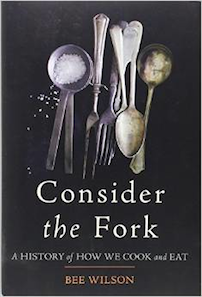By Colin Rafferty
“We are often told that we live in a ‘technological age,’” writes the British food writer Bee Wilson in the introduction to Consider the Fork. “This is usually a way of saying: we have a lot of computers.” Wilson’s book, though, surprises the reader with its expansive definition of food technology. Such futuristic devices as the sous-vide (which cooks vacuum-sealed bags of food as a precise temperature) appear, but Wilson’s attention and affection are focused on less showy forms of technology, such as the cooking pot, the knife, fire, and the kitchen itself.
Wilson’s book is not simply a recitation of the developmental history of varying tools; she never loses sight of the fact that cooking is essential for human survival; as she points out, it’s not until the invention of the cooking pot (which made soups and stews possible), do anthropologists find adult skeletons without teeth, who would have starved to death without this invention. She discusses how varying cooking methods reinforced social classes (someone has to prep, cook, and clean all those foods and dishes), and even how the orthodontia of different nations was likely the result of how small they cut their meats and vegetables.
Wilson looks at how varying cultures have taken to new technologies—America turns out, not surprisingly, to be gadget-friendly; in 1959, 96% of American households owned a refrigerator, as opposed to 13% for Britain. She also explores lost technologies, and perhaps more interestingly, those who maintain these ways as culinary historians. Ivan Day, the foremost food historian in England, makes a few appearances, first slow-roasting a piece of veal on a spit, and later being the only person Wilson has met to have eaten ice cream made by Mrs. Marshall’s Patent Freezer, an 1885 ice cream maker four times faster than any model on the market today, but with the unfortunate side effect of leaching toxic zinc into the dessert. Day’s appearances, along with other food obsessives and fanatics, keep Wilson’s book from drifting into a dull explanation of technological developments, reminding us that food is always a human pursuit.
Consider the Fork is a fascinating book, written for a wide audience but always intelligent and respectful of the scientific and cultural forces that drive these innovations, and more importantly, the way that these innovations change our own lives. “In the most highly designed modern kitchen, we are still drawing on the tools and techniques of the past,” Wilson writes in her final chapter, and this is indeed a book from which to draw in the future, whether regaling a dinner party with tales of the late-19th century boom in American eggbeaters, or remembering as one opens a can of soup for one that while canned food first appeared in 1813, it wasn’t until 1855 that anyone thought to invent the can opener.
Colin Rafferty (ΦBK, Kansas State University, 1998) teaches nonfiction writing at the University of Mary Washington in Fredericksburg, Virginia. Mary Washington is home to the Kappa of Virginia chapter of Phi Beta Kappa.




